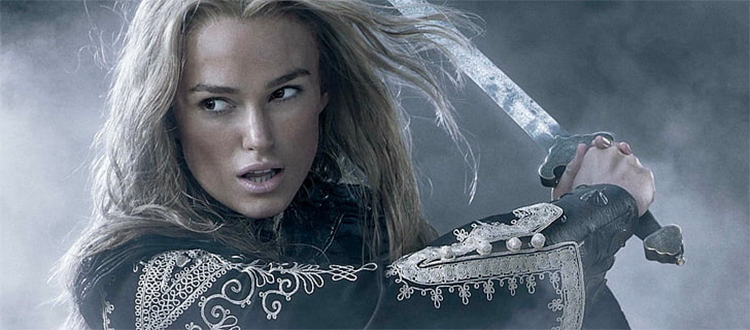Danger Gal Friday: Elizabeth Swan
This week’s Danger Gal is Elizabeth Swann from the Pirates of the Caribbean trilogy. This article contains spoilers for At World’s End, the latest movie.
Jacoby: I’m gonna teach you the meaning of pain.
Elizabeth: You like pain?
[Hits pirate in the head with a pole]
Elizabeth: Try wearing a corset.
Over the course of the three Pirates of the Caribbean (POTC) movies, Elizabeth Swann’s character leaves behind the world of her birth for a whole new one with its own set of rules.
The world of her birth restricted women and men both in how the genders related to one another, but also restricted freedom by class. Both Elizabeth and Will recognize this innately, but Elizabeth embraces crossing the threshold into a new world while Will resists it.
Physically, Will is closer to the pirate world by his birth as the son of a pirate, but Elizabeth is closer to this seemingly chaotic world in her heart and, while it’s a terrifying journey, she yearns for it and acts proactively to achieve being a part of it.
In all three movies, we see Elizabeth winning by the use of her intelligence. If this seems less obvious by the third movie, it’s because she has picked up all sorts of supplementary tools along the way, like sword-fighting. In POTC: The Curse of the Black Pearl, Elizabeth uses numerous objects as weapons from a chamber pot to a pole, but never is she seen using an actual weapon. Keira Knightley herself has lamented the fact in interviews saying:
“I’d wanted to get stuck into the action on Pirates of the Caribbean and I asked Jerry [Jerry Bruckheimer] if I could have a sword fight in that, and he more than made up for it in King Arthur (2004) by giving me axe fights, knife fights, and all the rest of it. I absolutely loved it. It was like being 11 years old and in the playground again.”
(That must have been some playground, Keira…)
There has been some comparison of Elizabeth Swann to Princess Leia, but the primary difference between them is that at the end of the trilogy Swann learns to swordfight while Princess Leia never wields a lightsaber. Lance Mannion compares POTC to Pride & Prejudice and laments that Swann is simply a “boy with breasts” instead of a truly heroic character as Knightley portrayed Elizabeth Bennett.
Elizabeth Bennett is indeed a superb character in a well-loved story, and while both stories deal with pushing the limits of proper behavior, there are two very important differences. One, genre. POTC is an action adventure story so loosely based on history and containing supernatural elements that I would label it historical fantasy. Pride & Prejudice on the other hand is a work of historical fiction meant to be a fairly accurate portrayal of its time. Two, POTC is fundamentally about totally breaking away from an established system in favor of a new way of living, instead of trying to make a current system work as Pride & Prejudice pursues.
Swann’s character achieves far more in the POTC trilogy than any of the male characters. She rises from being the governor’s daughter to that of a pirate ship captain to the Pirate King. While at first I was disappointed that she turned out not to be Calypso, Seo Feng’s bestowal of the Empress captainship to her came not just out of necessity, but it occurs after he realizes she really is just a regular girl. He judges her based on her human abilities, not on some mythical feminine ideal. Moreover, the trilogy depicts other women with power in the pirate world, most notably Tia Dalma (before we know her as Calypso), Anamaria and Mistress Ching.
We don’t know anything about Swann’s mother, but we do see that Elizabeth’s father values her opinion, despite the time period they live in:
Governor Swann: So, this is the path you’ve chosen? After all, he is a blacksmith.
Elizabeth: No.
[pause]
Elizabeth: He’s a pirate.
Moreover, even as a child Swann is given an important task of being Will Turner’s protector by Norrington, a future suitor:
Young Elizabeth: [Will awakes, grabbing her wrist] It’s ok. My name’s Elizabeth Swann.
Young Will: W-W-Will Turner
Young Elizabeth: I’m watching over you, Will.
In the end Swann and Turner agree to share each other’s burdens in a very egalitarian manner. The end of At World’s End did confuse me somewhat with it’s ambiguousness over whether Swann continues on as captain of the Empress or as the Pirate King while she raises her son and Will captains the Flying Dutchman. Ted Elliott, one of the trilogy’s writers, cleared that up on the WordPlayer Forum when he said:
And, there’s this: the question regarding Elizabeth in AWE is not “Who is Elizabeth going to be with?” It is “Who is Elizabeth going to be?” Perceiving her choices as nothing more than becoming either “Jack’s lover” or “Will’s lover” — well, that seems a bit diminishing, don’t you think?
In light of that, I think it’s safe to assume that Elizabeth continues to manage her own destiny and write a new role for herself in the world.
Links:
- Click here for links to many of the comments on the WordPlayer Forum from POTC writers Ted Elliott and Terry Rossio.
- Click here to read Elizabeth Swann’s entry on Answers.com.
- Click here to watch the extra scene from AWE that rolled after the credits.
- Kaellana also makes some excellent points about AWE.
- Feminist SF Blog Carnival article “White and Black Sexuality in Pirates of the Caribbean: At World’s End” by Lake Desire.


Great post! Loved the movie and love her character.
MOST excellent summary of a KILLER character and a fabulous trilogy.